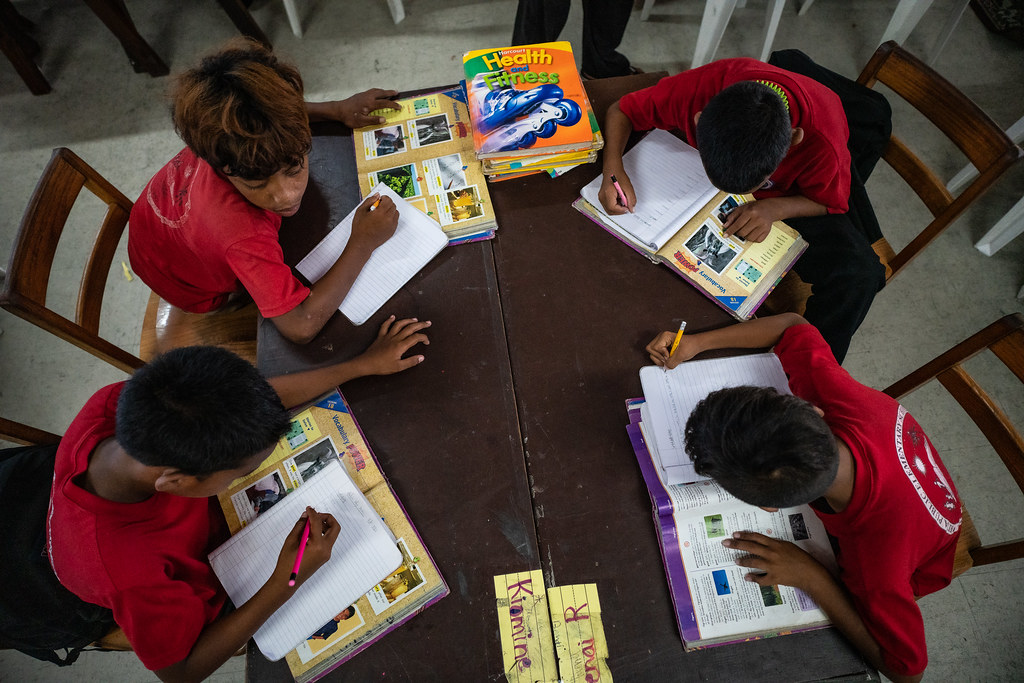RMI Education and Skills Strengthening Project
The Government of the Republic of Marshall Islands has gotten financing from the World Bank for the Education and Skills Strengthening Project (ESSP) cost. It intends to apply part of the proceeds for seeking advice from services.

The consulting services ("the Services") will assist the Project Manager and the RMI National Training Council in executing the World Bank-funded task effectively.
The assignment will concentrate on supporting the Project Implementation Unit (PIU) in creating a framework for Recognition of Prior Learning (RPL) for TVET, focused on assisting the College of the Marshall Islands and the RMI National Training Council evaluate and improve the abilities of employees through certified college certification.
The comprehensive Terms of Reference (TOR) for the project are indicated in the connected Terms of Reference (ToR).
The National Training Council now invites qualified people ("Consultants") to indicate their interest in offering the Services. Intrigued Consultants need to provide info demonstrating that they have actually the required certifications and pertinent experience to carry out the Services (connect a Cover Letter of no more than four (4) pages resolving the obligatory experience and certification requirements curriculum vitae with a description of experience in comparable tasks, similar conditions, etc). Firms' personnel might reveal interest through the using firm for the project. In such a scenario, just the experience and qualifications of people will be thought about in the choice process. The criteria for choosing the Consultant are: A.
Mandatory Qualifications and Experience Master's degree in education, training
, management, or a related field. Minimum of 5-10 years of experience working in TVET System. Curriculum Design and Systems.
Possess 2-5 years' experience creating and
carrying out RPL. structures, policies, and procedures. A sample of previous work will be needed as proof of previous experience. Outstanding interaction, training, and assistance
skills. Experience with dealing with diverse stakeholders, including federal government. firms, TVET institutions, companies, and students in the Pacific. B. Desired Qualifications and Experience Capability to deal sensitively in a multicultural
environment and develop efficient team relationships with customers and pertinent stakeholders. The attention of interested Consultants (including firms )is drawn to paragraphs 3.14, 3.16 and 3.17 of the World Bank's"
Procurement Regulations for IPF Borrowers "July 2016 revised November 2020" Procurement Regulations ", stating the World Bank's policy on dispute of interest. Further details can be obtained at the address below during workplace hours, 0900 to 1700 local time. Expressions of interest should be
provided in a written type to the address listed below (face to face or by e-mail )by 5:00 pm, 23rd December 2024.
The subject line needs to state:"National Training Council Strategic Plan Consultant -full name of the prospect". Julius Lucky Director National Training Council!.?.!ntcdr@ntcinfo.org:Phone: 692 625-4521 Empowering Community Champions for Sustainable Development in rmi national training council Gender Equality, Climate Resilience and Water Safety Training Majuro,
Republic of the Marshall Islands: The 4th
Women and Youth Training for
Gender Equality, Climate Change, Disaster Risk Reduction and Water Safety Management has actually recently occurred at the University of the South Pacific's campus in Majuro, the Republic of the Marshall Islands(RMI ). This important training was arranged by the United Nations Development Programme( UNDP )Pacific Office through the Addressing Climate Vulnerability in the Water Sector(ACWA) task. The week-long capacity-building training aimed to empower ladies and youth with the knowledge and practices required for climate-resilient water safety management in the
Republic of the Marshall Islands(RMI ). This training enhances a dedication to boosting rmi national training council's water security and community resilience against environment change impacts, particularly women
and youth, guaranteeing that nobody is left behind. The training invited individuals from all 24 atolls and featured resource speakers from government agencies, non-governmental companies, and worldwide advancement partners from the RMI Environmental Protection Authority, Climate Change Directorate, Office of the Chief Secretary, Ministry of Culture and Internal Affairs, National Disaster Management Office, Women United Together Marshall Islands, RMI Human Trafficking Task Force, Waan Aelõñ in Majel, Jo-Jikum, and the International Organization for Migration. In her opening remarks, Secretary for the Ministry of Culture and Internal Affairs, Brenda Alik, underscored the significance of collective action in building a climate-resilient country."It is our obligation to come together and work together. As we deal with the obstacles presented by climate change, understanding its impact on our water resources is necessary for enhancing the wellness of communities across the Marshall Islands,"she said.
RMI Environmental Protection Authority General Manager Moriana Philip highlighted in her speech the necessary role of females and youth in resolving climate-related obstacles."This workshop unifies us from various neighborhoods to deal with the pressing problems we face today, including climate-related challenges, especially on our water resources."We wish to highlight the essential role of women and youth in this job as your involvement is instrumental to its success and beyond, "she stated.
The very first day of the workshop covered crucial problems associated with gender equality, human rights, and public health within the Marshall Islands. It included discussions on gender equality and mainstreaming, focusing on the impacts of climate change on water security and the out of proportion effects on vulnerable groups. The importance of integrating gender equality and social addition into all project aspects was likewise talked about. Human rights and human trafficking were tackled, stressing the need for extensive defense of vulnerable populations
during emergencies. Additionally, the workshop attended to gender-based violence, highlighting the various forms that can emerge in catastrophe circumstances, such as domestic violence and sexual browbeating. The agenda concluded with a concentrate on sanitation and health and their crucial function in health, incomes, school presence, dignity, and building resistant communities. ACWA Project Manager Koji Kumamaru revealed his thankfulness to all individuals
, stressing the value of their contributions to their communities."Women and youth are key to the success of the ACWA job. More notably, you are the champs and future leaders who will return to your neighborhoods to empower others,"he said. Throughout the workshop, individuals went to Rongrong Island and analyzed the 15,000-gallon Flatpack Modular water tank installed at the Rongrong High School Boys Dormitory as part of the ACWA project. The setup is an essential element of the task, matched by assistance from Australia
's Department of Foreign Affairs and Trade. The check out served as a valuable direct experience of the positive impact of the ACWA project on the community and its
water resources. Marie Naisher from Jabat Island expressed her thankfulness for the opportunity to sign up with the workshop and explained her desire to be part of the project when it reaches Jabat.
"This was my first time participating in such training, and I learned a lot from the visitor speakers, group activities, and the site visit. I now understand the value of tidy water and how to sanitize it. I'm thrilled about the ACWA project coming to Jabat and ready to assist when it shows up,"she stated. Don Kobney, an ACWA website planner from Santo, Kwajalein, also shared his enjoyment."The workshop and website go to boosted my confidence and understanding of the water tank setup.
Seeing the 15,000-gallon flatpack modular water tank firsthand provided me a clear understanding of the system, and I'm anticipating sharing this knowledge with my neighborhood, "he stated. By the workshop's end, individuals were much better geared up to understand environment change and its local impacts, drive adjustment and mitigation efforts, particularly in water security, and utilize new resources to impact their communities positively. ACWA is made possible thanks to the assistance of the Green Climate

Fund, with the job co-financed by the Government of the Republic of the Marshall Islands
. The Marshall Islands: Skills Training and Vocational Education Project Evaluates the efficiency of the project and highlights lessons. Offers inputs to two more comprehensive evaluations- the regional assessment of ADB assistance for the Pacific and the unique evaluation study on Millennium Development Goals. The low academic achievement and lack of Marshallese skilled workers were mostly due to the low quality of fundamental education, lack of access to education in the outer islands, and weaknesses in skills training and the occupation and technical education system.
These supported an economy marked by high joblessness because of constrained private sector development and government downsizing. Unemployment was particularly high among the youth and women in the outer islands. Appropriate local skilled workers for existing job vacancies
were unavailable, hence the importation of properly experienced foreign employees. Hence, there was a mismatch in between available tasks and skills of the Marshallese labour force. These conditions offered the effort for the Government
of the Marshall Islands to focus on technical and professional education training reforms. In 2000, ADB approved a loan for $9.1 million to enhance skills training to provide trained employees required for sustained economic and social development. This was to be attained through an integrated national abilities training system. The project included 4 components: development of a profession awareness program, abilities training improvement, enhanced abilities training chances for females and youth, and institutional fortifying. The expected outcome was increased income-generating chances and employment for trainees, especially females and youth in the external islands. Overall, the job was rated unsuccessful. Limited progress was accomplished in making the task responsive to the requirements of its recipients and private-sector employers. The enduring weakness of bad numeracy and literacy proficiencies
among public elementary and secondary school graduates and dropouts getting in college or attending voc-tech education could be partially credited to the poor quality of basic education. The task was supply-driven and could not develop a strong linkage with economic sector requirements or align its activities with the needs of the labour market. The status of the technical and professional education training system has actually remained basically the same after project conclusion. The study advanced that ADB might encourage the Government of the Marshall Islands, through consultation and policy discussion, to follow through on the government's
dedication to establishing a committed labour info system to connect technical and trade education training program offerings with industry need. Although the project set up a labour market info system, in the lack of internal personnel capability at the National Training Council, it was not totally functional.


